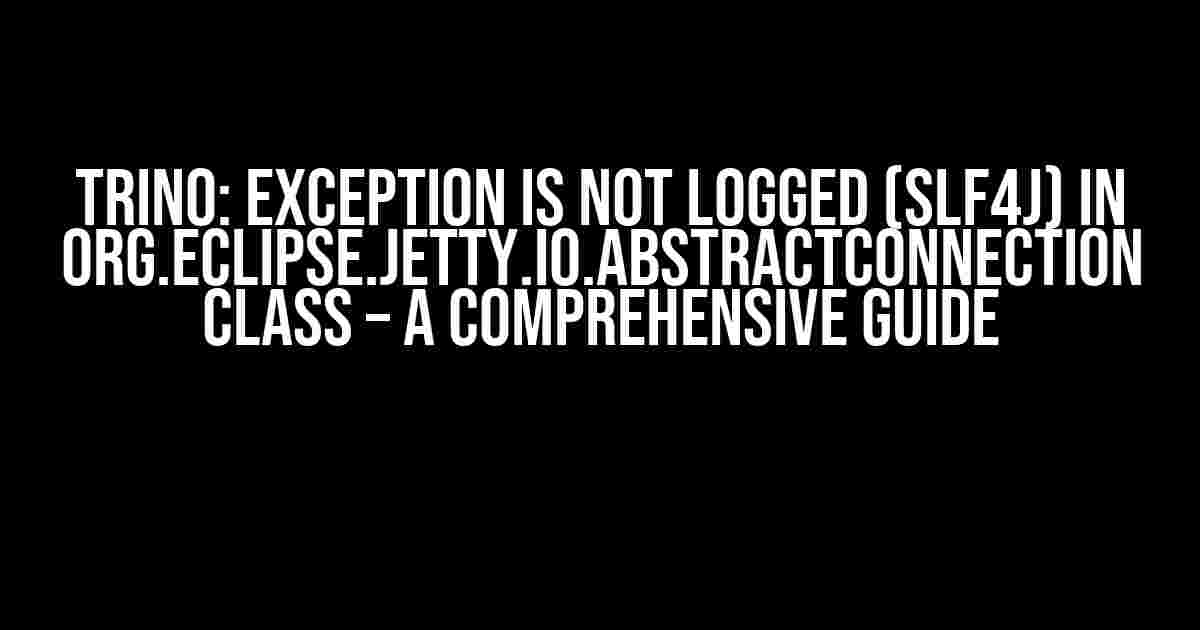Are you tired of encountering the frustrating “Exception is not logged (slf4j)” error in the org.eclipse.jetty.io.AbstractConnection class while working with Trino? You’re not alone! This error can be a real showstopper, but fear not, dear developer, for we’ve got you covered. In this article, we’ll delve into the world of Trino and slf4j logging, exploring the causes of this error and providing you with step-by-step instructions to resolve it once and for all.
- What is Trino and why do I care?
- What is slf4j and why do I care?
- The Error: Exception is not logged (slf4j) in org.eclipse.jetty.io.AbstractConnection class
- Causes of the Error: Exception is not logged (slf4j) in org.eclipse.jetty.io.AbstractConnection class
- Resolving the Error: Exception is not logged (slf4j) in org.eclipse.jetty.io.AbstractConnection class
- Conclusion
What is Trino and why do I care?
Trino is an open-source, distributed SQL query engine that’s gaining popularity in the data analytics space. It’s designed to be highly scalable, flexible, and fast, making it an ideal choice for big data and data warehouse workloads. If you’re working with large datasets, Trino is definitely worth exploring.
What is slf4j and why do I care?
Slf4j (Simple Logging Facade for Java) is a logging facade that provides a common API for various logging frameworks, such as Logback, Log4j, and Java Util Logging. It allows you to write log messages without worrying about the underlying logging implementation. In the context of Trino, slf4j is used to log important events, errors, and debug information.
The Error: Exception is not logged (slf4j) in org.eclipse.jetty.io.AbstractConnection class
So, what exactly is this error, and why does it occur? The “Exception is not logged (slf4j)” error typically manifests when Trino encounters an unexpected issue while processing a query or handling a connection. This error is particularly frustrating because it doesn’t provide much context or information about the underlying cause.
The error message itself is quite vague, making it challenging to pinpoint the root cause. However, after digging deeper, you might notice that the error is related to the org.eclipse.jetty.io.AbstractConnection class, which is responsible for handling connections in Trino.
Causes of the Error: Exception is not logged (slf4j) in org.eclipse.jetty.io.AbstractConnection class
So, what causes this error to occur? Let’s explore some common culprits:
- Incorrect slf4j configuration: If your slf4j configuration is not set up correctly, Trino might not be able to log exceptions properly. This can lead to the “Exception is not logged (slf4j)” error.
- Missing or incorrect dependencies: Trino relies on certain dependencies, such as Logback or Log4j, to log messages. If these dependencies are missing or incorrectly configured, you might encounter this error.
- Jetty configuration issues: The org.eclipse.jetty.io.AbstractConnection class is responsible for handling connections in Trino. If Jetty is not configured correctly, it can lead to this error.
- Trino configuration issues: Trino has its own set of configuration options that can affect logging behavior. If these options are not set correctly, you might encounter the “Exception is not logged (slf4j)” error.
Resolving the Error: Exception is not logged (slf4j) in org.eclipse.jetty.io.AbstractConnection class
Now that we’ve identified the common causes of this error, let’s dive into the steps to resolve it:
Step 1: Verify slf4j configuration
Check your slf4j configuration to ensure that it’s correct and complete. Make sure that you have the following dependencies in your project’s pom.xml file (if you’re using Maven) or in your build.gradle file (if you’re using Gradle):
<dependency>
<groupId>org.slf4j</groupId>
<artifactId>slf4j-api</artifactId>
<version>1.7.25</version>
</dependency>
<dependency>
<groupId>ch.qos.logback</groupId>
<artifactId>logback-classic</artifactId>
<version>1.2.3</version>
</dependency>
In your logback.xml file, ensure that you have the following configuration:
<configuration>
<include resource="org/slf4j/impl/StaticLoggerBinder.conf" />
<appender name="STDOUT" class="ch.qos.logback.core.ConsoleAppender">
<layout class="ch.qos.logback.classic.PatternLayout">
<Pattern>%d{yyyy-MM-dd HH:mm:ss} [%thread] %-5level %logger{36} - %msg%n</Pattern>
</layout>
</appender>
<root level="INFO">
<appender-ref ref="STDOUT" />
</root>
</configuration>
Step 2: Verify dependencies
Check your project’s dependencies to ensure that you have the correct versions of Logback and other logging frameworks. Make sure that you don’t have any conflicting dependencies that might be causing issues.
Step 3: Configure Jetty
Verify that Jetty is configured correctly in your Trino setup. Check the jetty.xml file to ensure that it’s correctly configured:
<Configure id="Server" class="org.eclipse.jetty.server.Server">
<Call name="addConnector">
<Arg>
<New class="org.eclipse.jetty.server.nio.SelectChannelConnector">
<Set name="host">localhost</Set>
<Set name="port">5432</Set>
<Set name="maxIdleTime">30000</Set>
</New>
</Arg>
</Call>
</Configure>
Step 4: Configure Trino
Verify that Trino is configured correctly to log exceptions properly. Check the trino.properties file to ensure that it’s correctly configured:
log.levels=file=INFO,console=INFO
In your trino.yml file, ensure that you have the following configuration:
logging:
level: INFO
loggers:
- logger: org.eclipse.jetty
level: INFO
- logger: io.trino
level: INFO
Step 5: Restart Trino and Verify
Restart your Trino server and verify that the error has been resolved. Check your logs to ensure that exceptions are being logged correctly.
| Step | |
|---|---|
| 1 | Verify slf4j configuration |
| 2 | Verify dependencies |
| 3 | Configure Jetty |
| 4 | Configure Trino |
| 5 | Restart Trino and Verify |
Conclusion
The “Exception is not logged (slf4j)” error in the org.eclipse.jetty.io.AbstractConnection class can be a frustrating issue, but with the right steps, you can resolve it and get back to working with Trino. Remember to verify your slf4j configuration, dependencies, Jetty configuration, and Trino configuration to ensure that everything is set up correctly. By following these steps, you’ll be able to log exceptions properly and troubleshoot issues more effectively in Trino.
Happy troubleshooting, and may the logging be with you!
Frequently Asked Question
Are you facing issues with Trino and SLF4J logging? Don’t worry, we’ve got you covered!
Q1: What is the issue with Trino and SLF4J logging?
The issue arises when an exception is not logged in the org.eclipse.jetty.io.AbstractConnection class, causing errors in the Trino application. This is specifically related to SLF4J logging.
Q2: Why does this issue occur in Trino?
This issue occurs due to the way Trino handles exceptions and logging. Sometimes, the exceptions are not propagated to the SLF4J logger, resulting in unlogged errors.
Q3: How can I troubleshoot this issue in Trino?
To troubleshoot this issue, you can try enabling debug logging for the org.eclipse.jetty.io.AbstractConnection class. This will provide more detailed logs to help you identify the root cause of the problem.
Q4: Can I customize the logging behavior in Trino?
Yes, you can customize the logging behavior in Trino by configuring the SLF4J logger. You can adjust the log levels, add custom log appenders, and more to suit your needs.
Q5: What are some best practices for logging in Trino?
Some best practices for logging in Trino include using meaningful log messages, logging at appropriate levels (e.g., INFO, DEBUG, ERROR), and configuring log rotation and retention to manage log files effectively.


